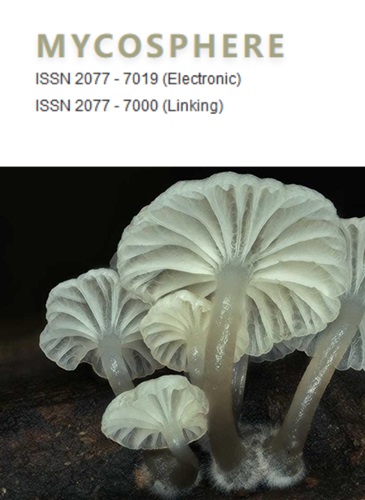Ganodermataceae (Polyporales): Diversity in Greater Mekong Subregion countries (China, Laos, Myanmar, Thailand and Vietnam)
IF 15.1
1区 生物学
Q1 MYCOLOGY
引用次数: 30
Abstract
Taxa of Ganodermataceae have been widely used as traditional medicines for centuries in Asia. Despite several taxonomic investigations, relationships and classification of many species are still unresolved. Species in this family are either pathogenic, wood decaying and/or wood inhabiting. In this paper, we introduce, a collection of Ganodermataceae species based on fresh and dried specimens found within the Greater Mekong Subregion countries; China, Laos, Myanmar, Thailand and Vietnam. Amauroderma schomburgkii, A. rude, Haddowia longipes, Ganoderma lingzhi, G. luteomarginatum, G. subresinosum and G. tropicum from Laos, G. australe and G. multiplicatum from Myanmar, G. donkii from Thailand, G. adspersum from Thailand and Myanmar, G. flexipes, G. gibbosum, G. orbiforme, and G. neojaponicum from both Laos and Myanmar, are newly recorded species for these countries. We also identified A. schomburgkii and A. rude, based on morphology and the other species based on both morphology and DNA sequence data. Two species; G. nasalanense Hapuar., Pheng., & K.D. Hyde, sp. nov., and G. sandunense Hapuar., T.C. Wen & K.D. Hyde, sp. nov., are new to science and established with morphological and DNA sequence based evidence. All taxa collected are described and illustrated with coloured photographs. We present an updated phylogeny for Ganodermataceae based on nrLSU, ITS, nrSSU, TEF1 and RPB2 DNA sequence data and species relationships and classification are discussed.灵芝科(多孢子目):大湄公河次区域国家(中国、老挝、缅甸、泰国和越南)的多样性
灵芝科植物在亚洲被广泛用作传统药物已有几个世纪的历史。尽管进行了一些分类学研究,但许多物种的关系和分类仍然没有解决。这个科的物种要么是致病的,要么是木材腐烂的,要么是木材栖息的。本文介绍了在大湄公河次区域国家发现的灵芝科植物的新鲜和干燥标本;中国、老挝、缅甸、泰国和越南。这些国家的新记录种有糙皮黑霉、长形哈氏黑霉、灵芝灵芝、老挝的木犀黑霉、亚树脂黑霉和热带黑霉、缅甸的australe和multiplicatum、泰国的donkii、泰国和缅甸的adsperum、老挝和缅甸的flexipes黑霉、gibbosum黑霉、orbiforme黑霉和neojaponicum黑霉。我们还根据形态鉴定出schomburgkii和A. rude,并根据形态和DNA序列数据鉴定出其他物种。两个物种;nasalanense Hapuar;, Pheng。海德(K.D. Hyde, sp. 11 .)和哈普瓦尔(g.s andunense Hapuar)。, T.C. Wen和K.D. Hyde, sp. nov,是科学上的新手,并以形态学和DNA序列为基础建立了证据。所有收集到的分类群都用彩色照片加以描述和说明。本文基于nrLSU、ITS、nrSSU、TEF1和RPB2 DNA序列数据,对灵皮科植物的系统发育进行了更新,并对物种关系和分类进行了讨论。
本文章由计算机程序翻译,如有差异,请以英文原文为准。
求助全文
约1分钟内获得全文
求助全文
来源期刊

Mycosphere
MYCOLOGY-
CiteScore
30.00
自引率
8.20%
发文量
9
审稿时长
4 weeks
期刊介绍:
Mycosphere stands as an international, peer-reviewed journal committed to the rapid dissemination of high-quality papers on fungal biology. Embracing an open-access approach, Mycosphere serves as a dedicated platform for the mycology community, ensuring swift publication of their valuable contributions. All submitted manuscripts undergo a thorough peer-review process before acceptance, with authors retaining copyright.
Key highlights of Mycosphere's publication include:
- Peer-reviewed manuscripts and monographs
- Open access, fostering accessibility and dissemination of knowledge
- Swift turnaround, facilitating timely sharing of research findings
- For information regarding open access charges, refer to the instructions for authors
- Special volumes, offering a platform for thematic collections and focused contributions.
Mycosphere is dedicated to promoting the accessibility and advancement of fungal biology through its inclusive and efficient publishing process.
 求助内容:
求助内容: 应助结果提醒方式:
应助结果提醒方式:


